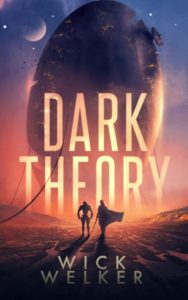
We’ve made it to the finals of the third annual Self-Published Science Fiction Competition. My team has whittled down a slush pile to two semifinalists, and then joined up with two more teams to cut our combined six semifinalists to just two finalists. Now everybody is reading the same books, as only six remain. Though four are new to my team, I’d previously read Three Grams of Elsewhere, so I had just three new reads for this round, and I decided to start with the longest, the sci-fi epic Dark Theory by Wick Welker.
Dark Theory takes place in an unrecognizable section of far-future Earth, a toxic wasteland that seems only to be getting worse. It frequently shifts between various perspective characters, but almost all the leads are in the orbit of Beetro, a robot who wakes up in a junkyard with no memory and only one objective: finding the man he presumes to be his maker. In doing so, he falls in with a thief looking for a big score and a street kid who uses her strange abilities mostly just to survive. Over the course of the book’s 800 pages, their paths will cross with a young man—the last major perspective character—from a clandestine underground society, a general bent on conquering the land, a drunken scientist, a strange woman speaking an unfamiliar language, a small army of cyborgs, and more. And while all of them have their own short-term objectives, the long-term conflicts are all about finding ways to survive an earth that seems less and less hospitable by the day.
It’s not too hard to see why this is a finalist. The prose is smooth and easy to read, the immense scope calls to mind beloved fantasy adventures, and each perspective character gives the reader plenty of reason to care about their fate. But while it’s easy to see the positives in each of those areas, none of them struck me as unambiguous positives, which is a big reason that my impression falls out of line with the first two rounds of judges.
The prose is undoubtedly smooth, but it also doesn’t bring much life to the story. The aim clearly seems to be a writing style that communicates what’s happening with neither impediment nor adornment, and if that’s the goal, it largely succeeds. But while it may communicate what’s happening, it doesn’t bring the events to life in a way that sucks the reader into the story. Instead, it supplements showing the events with a lot of additional telling that can make the narration seem repetitive. It describes the action, then summarizes the description—often using colloquialisms and cliches—in what feels like an attempt to ensure the reader hasn’t missed any key developments. While that may make for a writing style that’s easy to read quickly without fear of overlooking important information, it also makes for a story that feels every bit of its 800 pages.
Of course, feeling long isn’t a deal-breaker in epic stories, even ones not known for their immersive prose. But if a story isn’t generating immersion via the words themselves, it needs to make up for it in the plotting, worldbuilding, or characterization. And Dark Theory really doesn’t. Each character starts with a motivating goal that helps generate the initial reader investment, and they don’t necessarily fall straightforwardly into heroes and villains either, but they do tend toward having one major trait that defines their entire arc. There’s plenty to say about choosing the sort of person one wants to be and fighting the misanthropy that comes in a society that seems to betray you at every turn, but at the same time, it only goes so deep. Certainly not a deal-breaker from a story perspective, but not a deal-maker either.
And the plotting and worldbuilding are much the same. The animating goals are interesting enough, but the narrative drops enough hints about what’s ahead that the story can’t sustain itself on either the mystery of what happens next or a series of jaw-dropping revelations–especially for a reader with some genre-savvy. The post-apocalyptic world makes for an intriguing setting, but the scientific details of how it got the way it is are simultaneously explained in too much detail and not sufficiently connected to real-world scientific understanding to address the inevitable “wait, that doesn’t sound quite right” responses. It sometimes feels like an epic fantasy that’s really excited about exploring its magic system, except that the magic system is dressed in the clothes of science.
Overall, there’s a lot about Dark Theory that feels solid and professional and not very many deal-breakers. The biggest problem is that there just aren’t enough deal-makers either, and in a book of over 800 pages, there really needs to be. Were this book 500 pages, it’d be an easy three stars, with the possibility for four with strategic tightening up of various elements. But an especially long book has a harder job keeping the reader’s attention, and a book that can’t do that will make for an unpleasant read, even if no single element is particularly offensive. Dark Theory offers decent but simple characterization, competent but not gripping prose, and a plot and world that garners initial attention but offers neither the excitement nor intricacy to sustain that attention over the book’s full length. For a popcorn thriller, that may be enough. For a book with the scope and ambition of Dark Theory, it unfortunately is not.
Recommended if you like: digging into a long stories that aren’t hard to follow.
Can I use it for Bingo? It’s hard mode for Multi-POV, Prologues and Epilogues, and Criminals. It’s also Self-Published, Features Dreams, features a Character with a Disability, includes Reference Materials, is First in a Series, and features a setting Under the Surface.
Overall rating: 10 of Tar Vol’s 20. Two stars on Goodreads.
SPSFC score: 5/10 for my personal score. The official team score will be determined in concert with my teammates.
